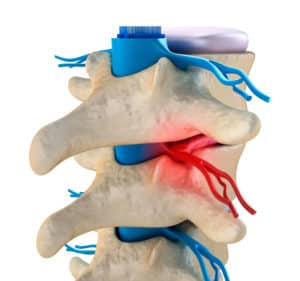
How a Car Accident Can Cause Pinched Nerves
The most common example of a pinched nerve is also the mildest: the sensation of part of your body “falling asleep.” If you’ve ever been sitting in one position for too long or with your legs crossed then you may have had your foot “fall asleep.” That strange tingling, numb sensation is what happens when a nerve that typically communicates with that foot has been compressed so it is unable to function. This type of pinched nerve typically goes away relatively quickly once you change positions or start moving around.
However, what about a pinched nerve where that “pins and needles” or “falling asleep” doesn’t go away? More serious cases of pinched nerves can be caused by injuries sustained in a car accident. Here are four common examples of car accident injuries and how they can cause a pinched nerve:
Whiplash
Did you know that whiplash is actually the most common car accident injury? That’s because while some safety features in your car like seat belts and airbags are able to help hold your upper body in place, there is nothing to prevent your head and neck from getting shaken up during the crash. A common example of whiplash can occur when you are rear-ended and the force of impact causes your head and neck to snap forward and backward violently. You may not feel it immediately because whiplash symptoms could sometimes be delayed.
Neck Sprain or Strain
Neck sprains and strains can occur with whiplash because of how your neck muscles are strained out of their normal range of motion due to the force of the accident. This can cause swelling and even tearing of your neck muscles if the force is violent enough. Sprains and strains that lead to swelling can compress nearby nerve endings and lead to a pinched nerve.
Herniated Disc
A herniated disc can also occur with whiplash and also due to the effects of the car accident on your spine. A herniated disc refers to the spinal discs that separate each of your vertebrae slipping or being forced out of place. If one of these discs isn’t properly aligned, it can bulge out of its normal space and put too much pressure on nearby nerves.
Blunt-Force Trauma
Blunt-force trauma refers to any time you hit part of your body really hard against another surface. In a car accident, you might hit your head, back, or shoulder against part of the car. This can lead to compressed nerves in your body as pain and inflammation set in.
Signs and Symptoms of a Pinched Nerve
Signs and symptoms of car accident injuries like a pinched nerve can take hours or even days to appear once your adrenaline and shock finally wear off. Pain may be the first symptom you experience, followed by a tingling, “pins and needles” sensation. You may even start to experience numbness in a body part. These sensations can come and go or stay consistent until you start treatment with an accident doctor. Pinched nerves can also cause symptoms like muscle spasms and twitching, tender skin near the pinched nerve, and even loss of motion.
Treating a Pinched Nerve
A car accident chiropractor can start treating your pinched nerve right away by addressing the root cause of the pinched nerve. Once your car accident chiropractor determines what is compressing your nerve, they begin treatments to help relieve that pressure. Gentle, therapeutic massage and chiropractic adjustments are two types of techniques a car accident chiropractor may use to provide you with lasting relief from a pinched nerve. If you were recently in a car accident and keep noticing pain, tingling, and numbness in a certain area, then talk with a car accident chiropractor at ProCare Medical Center as soon as possible. If you have experienced any of the signs or symptoms of a pinched nerve, contact ProCare today and learn more about treatment options for car accident injuries like a pinched nerve.



